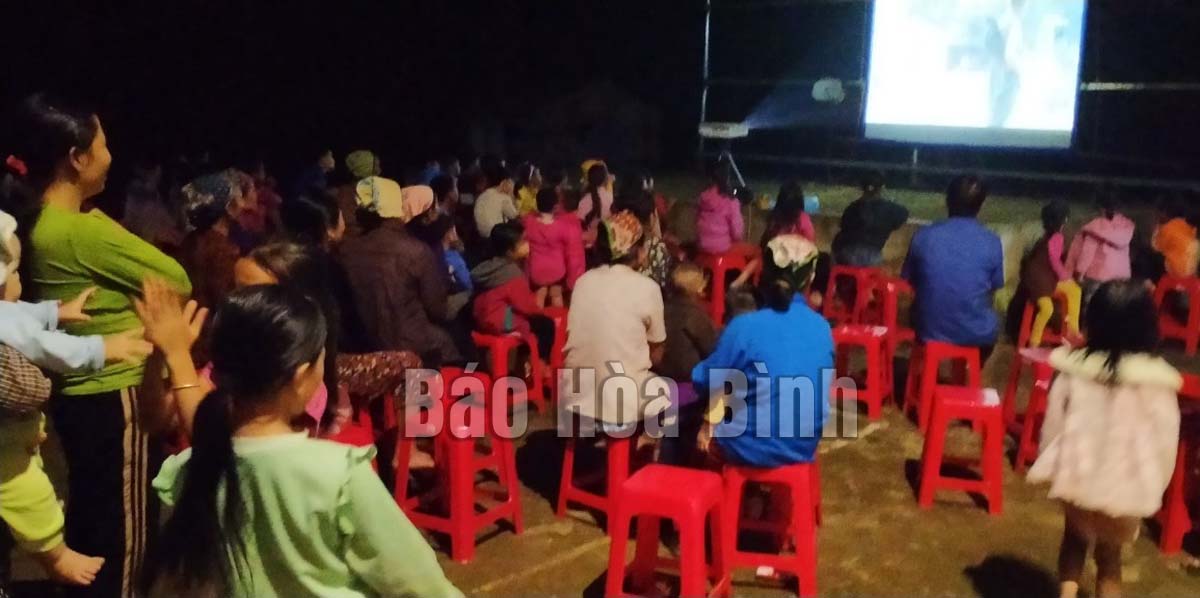
(HBO) – Amid the current information explosion and the rise of the media, entertainment, and social networks, not many people remember the film screening team at a time when TV sets were unavailable. Over the past years, film screening teams have worked to perform the political task of improving spiritual and intellectual lives in remote, mountainous and especially disadvantaged areas.
\Photo: A movie screening session of the team No.1 (the provincial Centre
on Culture-Cinema) in Nang hamlet, Quyet Thang commune, Lac Son district in
2020
The movie screening team No.1 under the
provincial Centre on Culture-Cinema was honoured by the Steering Committee for
Awards on popularisation of literature, arts and journalism themed "Studying
and following t
hought, moral virtues and lifestyle of
President Ho Chi Minh” for its outstanding achievements for the 2018-2020
period. Bach Thanh Tinh, an official from the team said at this time, movies
marking Day of Invalids and Martyrs will be screened. However, due to the
COVID-19 pandemic, the plan has been cancelled.
In January 2019, the provincial Centre on
Culture-Cinema was established with the task of screening films and bringing
culture, artworks and films to residents in remote, mountainous and ethnic
minority areas to disseminate the Party and State’s guidelines and policies to
people, contributing to improving intellectual standards, reducing poverty, and
building a healthy cultural environment, and for the sake of political
stability, socio-economic development and national defence-security
maintenance.
In early 2020 when the COVID-19 pandemic broke
out, there were only 216 film screening sessions serving 12,390 audiences,
mostly history films and documentaries about life and career of President Ho
Chi Minh, and war-themed films released by the Vietnam Cinema Department. The
team also worked with departments, agencies and localities to disseminate laws,
prevent social vices, encourage agriculture and forestry, raise public
awareness of new rural development, and honour outstanding people and good
deeds.
Deputy Director of the centre Do Quoc Cuong said
despite hard working conditions and limited income, members of the team always
encourage each other to uphold the sense of responsibility and fulfill assigned
tasks./.
Phong Phu commune, Tan Lac district of Hoa Binh province, is widely regarded as the cultural heartland of the Muong ethnic group. Among its many traditional communities, Luy Ai hamlet (formerly Ai hamlet) stands out as a rare location where the customs and way of life of the Muong Bi people remain largely intact.
The Truong Kha temple festival, a distinctive cultural event held every three years in Vu Ban township, Lac Son district, returned recently with vibrant rituals and folk traditions of the Muong people. Located next to the Buoi River in the Muong Trao fields, the Truong Kha Temple is dedicated to the three Kun Dol deities, revered for teaching farming techniques, irrigation, weaving, and protecting the harvest.
The demand for spaces serving community activities of residents in various areas across Hoa Binh city has been satisfied as local cultural houses now feature modern, spacious facilities thanks to the effective implementation of Resolution No. 49/NQ-HDND issued on December 28, 2021 by the city People's Council, which approved the plan for reorganising, converting, and allocating land for the construction, repair, and expansion of cultural houses in Hoa Binh’s villages and residential areas until 2025.
At the end of May, the Hoa Binh Provincial Ethnic Arts Troupe organized a series of performances for residents in Region 2 and Region 3 communes across the province. Bringing art to ethnic communities in remote, isolated, and especially disadvantaged areas has become a meaningful activity. These are not merely artistic performances but also journeys to disseminate cultural values, enrich spiritual life, and contribute to preserving the cultural identity of ethnic minorities.



